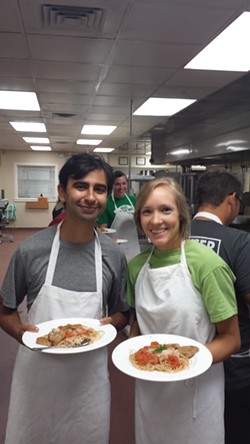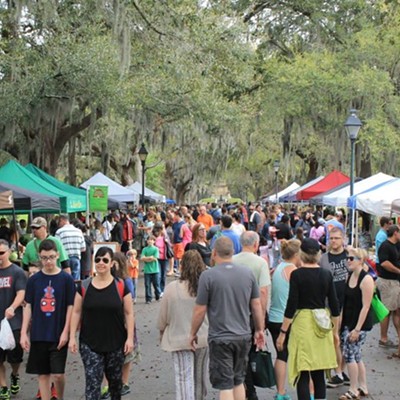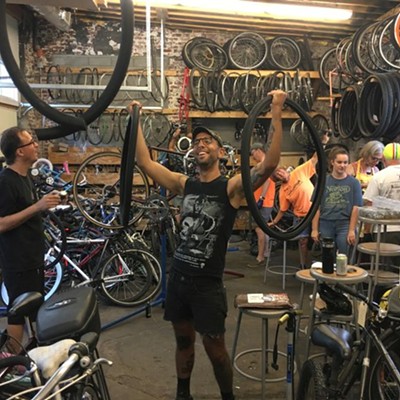KEVIN JILES has no problem with the thought of wielding a scalpel on a live human being. But when it comes to chopping vegetables, the second year medical student admits to being a bit flummoxed.
“I really didn’t know how to cut an onion properly,” laughs Jiles, who is aiming for a surgical residency.
He and 11 other Mercer Medical College students recently had the opportunity to work on their kitchen knife skills as part of Mercer’s Culinary Medicine program, a hands-on curriculum that helps future physicians better advise patients how healthy eating can affect overall health.
Combining cooking classes, scientific research and community engagement, the program debuts this fall on Mercer’s Savannah campus.
Though the Journal of the American Medical Association (JAMA) cites food as the prime factor in the development and/or prevention of disease, little of the time spent in medical school is spent on its possible uses in healing. With the adoption of the Culinary Medicine program, however, Mercer students are learning to parlay scientific knowledge into beneficial practice.
“We learne about the biochemistry, but not a lot about applied nutrition,” says Jiles.
“This is teaching us to be able counsel more efficiently.”
His classmate Evelyn Coile came into the program already comfortable in the kitchen. She sees the inexpensive, easy-to-follow recipes as a way to inspire healthier eating habits among low-income communities, where rates of diabetes, heart disease and obesity are at epic proportions.
“This can really help reach a population that has relied on packaged and fast food,” says Coile.
“If we can show that preparing healthy meals makes sense economically, maybe they’ll opt for that instead of reaching for a cheap burger.”
The program complements Mercer’s emphasis on public health, part of its conventional curriculum that requires students to volunteer in the community to better understand how socioeconomics, culture and lifestyle determine outcomes.
Says Coile: “We’re constantly examining the social factors in health.”
Facility in the kitchen is a growing trend in medical education. Developed in 2011 at Tulane University School of Medicine by chef and internist Dr. Timothy Harlan, the Culinary Medicine program was first implemented the program at a nearby clinic in a community that had been devastated by Hurricane Katrina.
Dr. Harlan—aka “Dr. Gourmet”—partnered with noted culinary institute Johnson & Wales to ensure the med students knew not only what foods to promote and eat themselves, but how to make it taste delicious.
“No one had ever done this before!” exclaimed Dr. Harlan in an interview with the American Society of Nutrition earlier this year.
“What does it mean to teach medical students to cook? How do you make it meaningful for them and their patients? How do you prove efficacy? Since I’m an evidence-based physician, I definitely wanted to make this very academic.”
A series of eight modules containing research articles and best practices followed, and Dr. Harlon’s pilot program grew quickly. The Goldring Center for Culinary Medicine now provides a blueprint for 15 medical schools around the country, ten percent of total educational medical institutions.
The Culinary Medicine program is not required for Mercer students, but there have been no shortage of volunteers. The first sessions packed the kitchen of Landings Executive Chef Matt Roher, who demonstrated a recipe for a meat-optional pasta sauce and tips for quick clean-up.
“It’s an honor being able to provide this foundational training for our future doctors and medical professionals,” says Roher, a longtime proponent of the local farm-to-table movement in Savannah.
“These bright med students could very possibly be caring for my wife, children and loved ones someday. Knowing that they are trained and appreciate the ‘food’ factor as it relates to overall health is very encouraging for the future of care.”
In addition to cooking and basic food safety lessons with Chef Roher, the program contains a vital community outreach component. The adoption of the Culinary Program at Mercer grew out of the school’s established partnership with the Forsyth Farmers Market, where medical students have been providing free monthly health screenings on Saturday mornings for the past year.
The Culinary Medicine program joins strategies like double EBT dollars and food preservation workshop to further improve accessibility to healthy lifestyle choices.
“This has really validated our overall mission,” remarks market director Teri Schell.
“I’m excited about the potential for research and further study to see if what we’re doing at the market is making an impact on people’s health.”
The program is also a chance to put into action FFM’s new Farm Truck 912, funded in part by Gulfstream’s Be Well, Live Well initiative. Bright green with flourishes by local artist Jose Ray, the mobile market is a novel way to bring fresh produce and organic ingredients to those who can’t make it to the park on Saturdays.
It’s also a way to reach people who believe that eating healthy isn’t affordable or convenient.
The market’s EBT program rolls with the truck, and FFM is helping facilitate cooking classes at various community centers around the city starting next month.
Assisting in those classes will be Mercer’s doctors-in-training, armed with their recently acquired culinary skills. It may not be surgery just yet, but the med students are ready to practice.
“In medical school, there’s the concept of ‘see one, do one, teach one,’” says Jiles.
“They’re talking about procedures, but we’re using it to take what we learn in the kitchen and bring it to others.”






























